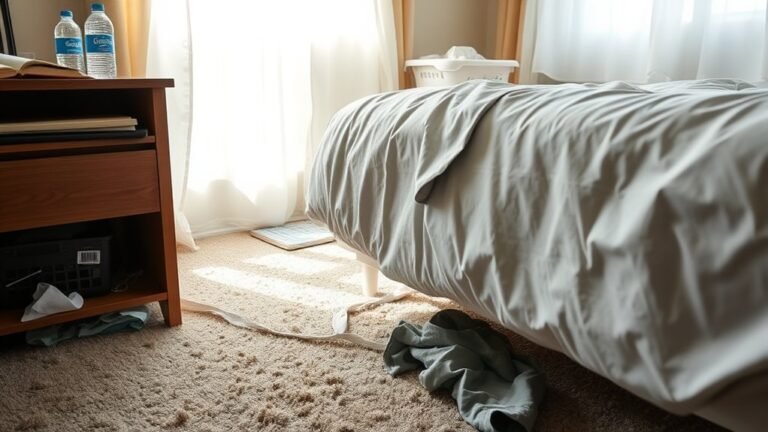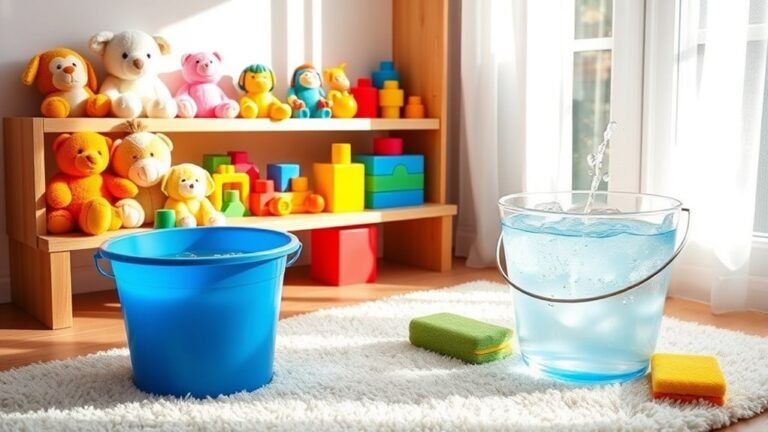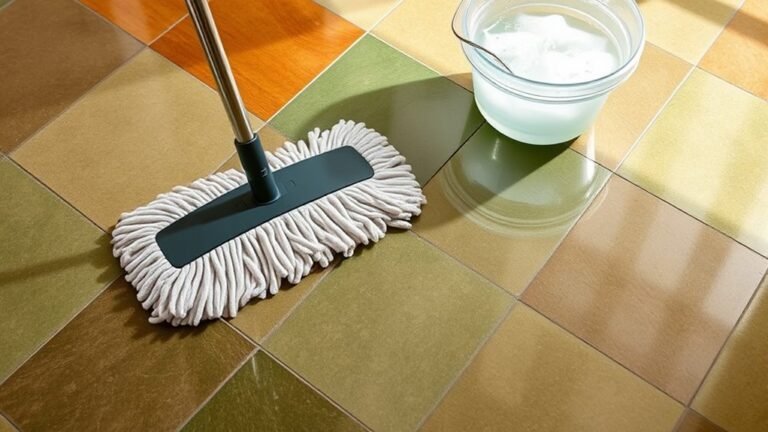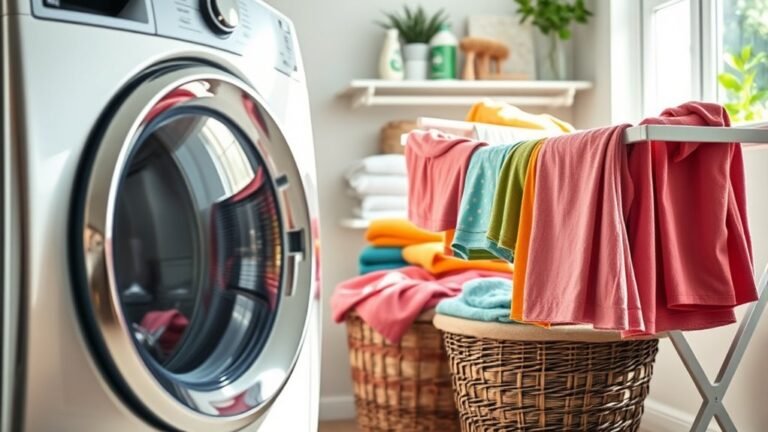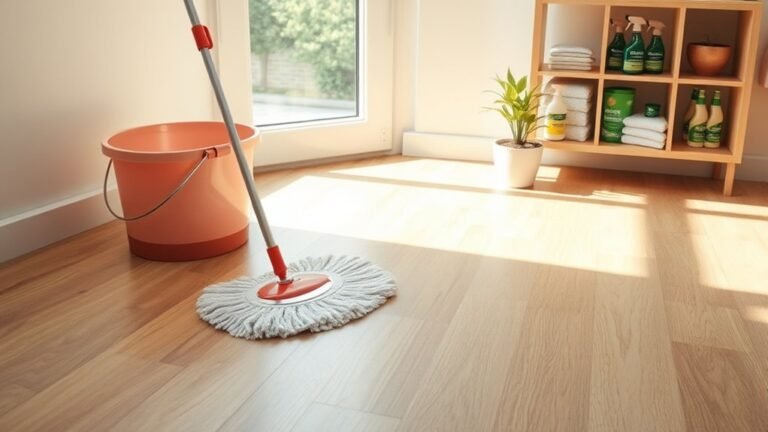Cleaning Mistakes That Damage Your Window
You’re damaging your windows if you use abrasive tools or harsh chemicals, which can scratch glass and degrade coatings. Cleaning in direct sunlight causes streaks due to rapid drying, while paper towels often leave lint and smudges. Ignoring window frame care and neglecting screen cleaning leads to deterioration and airflow problems. Using dirty cloths or too much pressure also harms surfaces. Regular, gentle maintenance is key—there’s more to discover to keep your windows pristine and lasting.
Using Abrasive Cleaning Tools

Although abrasive cleaning tools might seem effective for scrubbing stubborn dirt, using them on your windows can cause irreversible damage. You should carefully consider the abrasive pad types before applying any to your window surface materials. Pads with coarse textures can scratch or etch delicate surfaces like coated glass or acrylic, compromising clarity and protection. Even finer abrasive pads may leave micro-abrasions that attract dirt or weaken coatings over time. To maintain your windows’ integrity and transparency, select non-abrasive, soft cleaning tools designed specifically for glass or plastic. This approach preserves freedom from costly repairs and guarantees your windows remain pristine. Avoid shortcuts with harsh abrasives—prioritize gentle, compatible cleaning methods tailored to your specific window materials for lasting results.
Applying Harsh Chemical Cleaners
When you apply harsh chemical cleaners to your windows, you risk degrading the surface coatings and weakening the glass over time. These strong substances often leave behind chemical residue that can cause long-term damage and discoloration. To protect your windows, it’s essential to evaluate cleaner compatibility—ensure the product is specifically designed for glass and won’t react adversely with any protective films or tints. Avoid ammonia-based or acidic cleaners, which are notorious for causing surface deterioration. Instead, choose gentle, pH-balanced solutions that effectively remove dirt without compromising integrity. Remember, freedom in maintaining your windows comes from understanding the delicate balance between effective cleaning and preserving their lifespan. By being precise in your choice of cleaners, you safeguard your view while avoiding costly repairs or replacements.
Cleaning Windows in Direct Sunlight

Choosing the right cleaner is only part of maintaining your windows effectively; the timing of your cleaning plays a significant role as well. Cleaning windows in direct sunlight might seem convenient, but it often leads to uneven drying caused by sunlight glare. This glare heats the glass surface rapidly, accelerating evaporation and causing streaks or residue to form. Additionally, temperature fluctuation between shaded and sunlit areas can cause cleaning solutions to dry too quickly, making it difficult to achieve a spotless finish. To avoid these issues, plan your cleaning for cooler parts of the day, like early morning or late afternoon, when sunlight glare is minimal. This approach guarantees a thorough, streak-free clean, preserving your window’s clarity and your freedom from constant re-cleaning.
Ignoring Window Frame Maintenance
You can’t overlook your window frames when cleaning, as each material—wood, aluminum, or vinyl—requires specific care. Using the wrong cleaning solution can damage finishes or cause deterioration over time. Regularly inspecting your frames for cracks, peeling, or moisture buildup is essential to maintain their integrity and prolong their lifespan.
Frame Material Awareness
Although the glass itself often gets the spotlight, neglecting the window frame’s material can lead to costly damage and reduced efficiency. You need to recognize the frame types—wood, vinyl, aluminum, or composite—because each demands specific care. Using incompatible cleaning methods or products can degrade finishes, warp wood, or cause corrosion. For instance, wood frames require gentle, moisture-controlled cleaning, while aluminum tolerates more robust approaches but can oxidize if mishandled. Understanding material compatibility guarantees you avoid harsh chemicals that strip paint or damage seals. By tailoring your maintenance to the frame type, you preserve structural integrity and extend your window’s lifespan. This awareness isn’t just about upkeep—it’s about protecting your investment and maintaining the freedom to enjoy clear views without unnecessary repairs.
Proper Cleaning Solutions
Anyone tackling window cleaning might overlook the importance of selecting proper cleaning solutions tailored specifically for the glass and surrounding materials. Choosing the right product guarantees your windows stay pristine without damage. Here’s what you need to focus on:
- Opt for eco friendly cleaners that won’t harm the environment or your health. These solutions are gentle yet effective, letting you clean confidently.
- Use streak free solutions designed to minimize residue and smudging. This assures crystal-clear glass and a polished finish.
- Avoid harsh chemicals like ammonia or bleach, which can degrade window seals and frames over time.
Regular Inspection Importance
Selecting the right cleaning solutions keeps your glass spotless, but maintaining the window frame often gets neglected, leading to long-term issues. Neglecting routine window inspection allows dirt buildup, moisture damage, and frame deterioration to worsen unnoticed. You need to prioritize regular checks to identify cracks, peeling paint, or warped wood early. These small defects, if ignored, compromise your window’s structural integrity and energy efficiency. Incorporating routine checks into your cleaning schedule helps you catch problems before they escalate, saving you costly repairs and preserving the window’s lifespan. Remember, freedom in your space means your windows perform flawlessly, and that starts with consistent frame maintenance through diligent window inspection. Don’t let neglect undermine your efforts—stay proactive for lasting clarity and durability.
Using Paper Towels for Cleaning
You might think paper towels are convenient for cleaning windows, but they often leave behind lint and residue that dull the glass. Plus, their rough texture can cause tiny scratches over time, compromising clarity. For a pristine finish, it’s best to choose softer, lint-free alternatives.
Paper Towels Leave Residue
Using paper towels to clean your windows might seem convenient, but they often leave behind lint and streaks that compromise clarity. If you want to maintain spotless glass without residue, consider these key points:
- Paper towels shed fibers that cling to wet surfaces, creating a dull, unclean appearance.
- The texture of paper towels can trap dirt instead of removing it, leading to smudges.
- Frequent replacement of paper towels wastes resources and increases cleaning costs.
For residue prevention, explore paper towel alternatives like microfiber cloths or lint-free cotton rags. These options provide superior absorption and leave surfaces streak-free, granting you the freedom to enjoy crystal-clear views without constant touch-ups. Choosing the right material guarantees your windows stay pristine while minimizing environmental impact.
Risk of Scratching Glass
While paper towels may leave behind unwanted residue, they also pose a risk of scratching your window glass. Their rough texture and embedded fibers can act like tiny abrasives, compromising the glass protection you aim to maintain. When cleaning, using paper towels can introduce micro-scratches that dull the surface over time, reducing clarity and longevity. To preserve your windows, opt for microfiber cloths or specialized glass cleaning techniques designed to be gentle yet effective. These alternatives minimize friction and prevent damage, allowing you to enjoy pristine, scratch-free glass. Remember, protecting your windows isn’t just about appearance—it’s about maintaining the freedom to see clearly without replacement costs or repairs due to careless cleaning methods. Choose wisely to guarantee lasting glass protection.
Neglecting to Rinse Cleaning Solutions

Although applying cleaning solutions is essential for removing dirt and grime, failing to thoroughly rinse them off can leave stubborn residues that attract dust and streaks. When you neglect this step, cleaning solution residue builds up, diminishing your window’s clarity and overall appearance. To avoid this common pitfall, follow these window maintenance tips:
- Use clean, warm water to rinse after applying any cleaning agent, ensuring no chemical traces remain.
- Wipe windows with a microfiber cloth post-rinse to eliminate lingering moisture and prevent streaks.
- Schedule regular rinsing intervals during cleaning sessions to maintain spotless, streak-free glass.
Overlooking Screen Cleaning
You might be overlooking your window screens during cleaning, but neglecting their maintenance can reduce airflow and trap dirt. Over time, accumulated debris not only blocks ventilation but can also degrade the screen material. Regularly cleaning your screens guarantees both ideal air circulation and extended screen lifespan.
Neglecting Screen Maintenance
Window screens act as an essential barrier against dust, insects, and debris, yet many people overlook their upkeep. Neglecting screen maintenance not only reduces window longevity but also invites damage that’s easily preventable. To keep your windows protected and functioning efficiently, focus on these key steps:
- Regular Cleaning: Use a soft brush or vacuum to remove accumulated dirt and pollen from your screens. This prevents buildup that can degrade the mesh.
- Inspect for Damage: Check for tears, holes, or loose frames. Addressing these promptly avoids costly repairs and maintains the screen’s protective role.
- Proper Storage: If you remove screens seasonally, store them in a dry, safe place to prevent warping or damage.
Impact on Airflow
Three key factors influence how well your screens maintain ideal airflow: cleanliness, integrity, and proper installation. If you overlook cleaning your window screens, accumulated debris creates airflow obstruction, restricting natural ventilation. This directly leads to ventilation issues inside your space, affecting comfort and air quality. When screens are clogged or damaged, they lose their ability to filter air effectively, forcing you to rely more on artificial cooling or heating. Properly maintained screens guarantee unrestricted airflow, preserving your freedom to enjoy fresh air without sacrificing indoor comfort. By regularly cleaning and inspecting your screens, you prevent airflow obstruction that compromises ventilation and overall window performance. Don’t underestimate this simple maintenance—your well-being and room environment depend on it.
Dirt Accumulation Effects
Although it might seem minor, neglecting to clean your screens allows dirt and debris to build up quickly, which can lead to several detrimental effects. Understanding dirt accumulation causes helps you appreciate why regular maintenance is essential. Overlooking screen cleaning compromises both function and aesthetics.
- Reduced Airflow: Dirt accumulation clogs screen pores, restricting natural ventilation and forcing your HVAC system to work harder.
- Visibility Impairment: Dirt buildup blurs your view and diminishes natural light, affecting your home’s ambiance.
- Material Degradation: Persistent grime can weaken screen fibers, leading to tears and costly replacements.
Using Dirty or Contaminated Cloths
One common mistake people make when cleaning their windows is using dirty or contaminated cloths. When you reuse microfiber cloths without proper washing, contamination sources like dust, grease, and residues accumulate. These particles can scratch or smear your glass, undermining your effort to achieve crystal-clear windows. To maintain freedom from streaks or damage, always use clean, dedicated cloths.
| Contamination Source | Effect on Window Cleaning |
|---|---|
| Dust and Dirt | Causes scratches and streaks |
| Oil and Grease | Leaves smudges and film |
| Detergent Residue | Reduces cloth absorbency |
Avoid these pitfalls by regularly washing microfiber cloths separately and storing them in a clean, dry place. This guarantees your windows stay pristine without compromise.
Applying Excessive Pressure While Cleaning
While it might seem like scrubbing harder will get your windows cleaner, applying excessive pressure can actually cause more harm than good. When cleaning your windows, mastering the right balance in pressure is essential to avoid damage. Here are three key reasons to avoid excessive pressure during your cleaning techniques:
- Glass Integrity: Pressing too hard can cause micro-cracks or even break the glass, especially in older or thinner panes.
- Frame Damage: Excessive pressure can warp or scratch window frames, compromising seals and insulation.
- Streak Formation: Over-scrubbing spreads dirt and residues, leading to stubborn streaks rather than a spotless finish.
Skipping Regular Cleaning Sessions
Regularly cleaning your windows is crucial to maintaining their clarity and function, yet many people tend to skip these sessions. Neglecting a consistent cleaning schedule allows dirt, grime, and environmental pollutants to build up, which can cause scratches and degrade the glass surface over time. By delaying cleaning, you risk shortening your window longevity and increasing the likelihood of costly repairs or replacements. Establishing and adhering to a routine cleaning schedule not only preserves the aesthetic appeal but also guarantees the structural integrity of your windows. Skipping regular maintenance compromises your freedom to enjoy clear views and natural light, ultimately restricting the comfort and value of your space. Prioritize consistent care to safeguard your windows and maintain their best performance for years to come.
Frequently Asked Questions
Can Hard Water Stains Be Removed Without Damaging Windows?
You can remove hard water stains without damaging your windows by using gentle, non-abrasive methods. Start with a vinegar and water solution to break down mineral deposits safely. Avoid harsh scrubbing or acidic cleaners that can etch the glass. For stubborn spots, a paste of baking soda and water works well. Always rinse thoroughly and dry with a soft cloth. This stain removal approach keeps your windows clear and intact, giving you freedom from worry.
How Often Should Window Seals Be Replaced?
Think of window seals as hardworking guardians with a limited seal lifespan, usually around 10 to 15 years. You’ll want to keep an eye out for replacement signs like foggy glass, condensation between panes, or drafts sneaking in. When these subtle hints appear, it’s time to swap them out. Staying on top of this guarantees your windows keep their freedom to protect and insulate your space efficiently, without unexpected surprises.
Are DIY Natural Cleaners Effective for Window Cleaning?
You’ll find DIY natural cleaners can be quite effective for window cleaning, especially if you favor eco friendly solutions. Homemade remedies like vinegar and water or lemon juice can cut through grime without harsh chemicals, preserving both your windows and the environment. Just make sure to use soft cloths and avoid abrasive materials. This way, you maintain clarity and extend your window’s life while enjoying the freedom of using safe, natural products.
What Is the Best Time of Year for Deep Window Cleaning?
Oh, sure, you could clean your windows in the dead of winter and freeze your fingers off, but why? The best time for deep window cleaning is during spring cleaning when seasonal maintenance is in full swing. You’ll enjoy clearer views and a fresh start without battling ice or scorching sun. Spring’s mild weather lets you work efficiently, so roll up your sleeves and let those windows shine, giving you freedom from grime and gloom.
Can Tinted Windows Be Cleaned With Regular Glass Cleaners?
You shouldn’t use regular glass cleaners on tinted windows because they often contain ammonia, which can damage the tint film. For proper tinted window care, opt for glass cleaner alternatives like a mixture of mild soap and water or specialized tint-safe cleaners. These options clean effectively without harming the tint, giving you freedom to maintain clarity and durability. Always use a soft cloth to avoid scratches and prolong your window’s lifespan.

